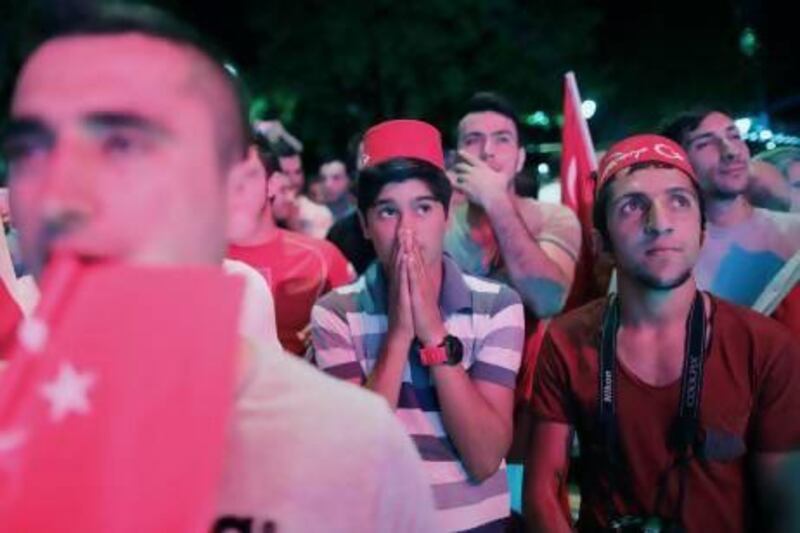ISTANBUL // Bitter Turkish officials yesterday blamed anti-government protesters who staged countrywide demonstrations in June for Istanbul's failed bid to host the Olympic Games.
Istanbul was one of the final three cities in the running to host the event in 2020, but lost out to Tokyo. It was country's fifth unsuccessful bid to host the Olympics.
"We will succeed in the end, God willing," Recep Tayyip Erdogan, the prime minister, said after the International Olympic Committee (IOC), meeting in Buenos Aires, chose the Japanese capital in a final vote on Saturday.
Melih Gokcek, mayor of Turkey's capital Ankara and a member of Mr Erdogan's ruling Justice and Development Party (AKP), said anti-government protesters whose demonstrations started in Istanbul's Gezi Park in June were to blame for the IOC decision.
Referring to an anti-Turkish rally in Buenos Aires, Mr Gokcek said on Twitter that "traitors from Gezi" had influenced the IOC vote. "Traitors, you can be proud of the bad things you have done to our country."
Yalcin Akdogan, an adviser to Mr Erdogan, said there were people in Turkey who felt "Schadenfreude" about Istanbul's defeat. But he added Turkey would continue its efforts to host the Olympic Games, possibly in 2024. "We will not give up," Mr Akdogan told the Kanal 7 news channel.
Trying to secure the games for Istanbul in 2020, three years before the centennial of the founding of the Turkish republic, was a major project for the Erdogan government in recent years.
Turkey earmarked billions of dollars for infrastructure projects and had a plan to build an Olympic complex from scratch, showcasing the country's economic prowess after a decade of record growth. A successful Turkish bid would have taken the Olympic Games to a predominantly Muslim country for the first time.
But Istanbul's bid - the fifth since an unsuccessful attempt to host the games in the year 2000 - was hampered by the wave of anti-government protests that killed six people and wounded thousands and the civil war raging in Syria, reports from Buenos Aires said. The third contender, Spain's capital Madrid, was unable to overcome doubts related to the country's current economic crisis.
"The certainty was a crucial factor - the certainty that they could deliver," IOC vice president Craig Reedie of Britain said about the candidates.
Australian member John Coates said the economic strength of Japan as the world's third-biggest economy was a key factor.
"Compare that to the economic uncertainty facing Spain and the political unrest that Istanbul experienced a few months ago and more particularly the unrest at the Middle East at the moment," he said. "The IOC, we've taken the safe bet."
Mr Erdogan, who had travelled to Buenos Aires, did not hide his disappointment, saying the Turkish delegation had "expected another thing" and pointing out that Tokyo, unlike Istanbul, had hosted the games before, in 1964. But he said Turkey respected the IOC's decision.
Opinions among Turkish citizens appeared to be divided yesterday. Some expressed disappointment, while others welcomed the IOC's decision, saying the heavy-handed police response to the June unrest had shown Turkey's deficiencies as a democracy.
"Everybody is sad," said Onder Son, 30, who was taking a stroll in the Buyukcekmece neighbourhood. "They should have given it to us, but they did not because we are a Muslim country."
Several others said they were glad the Istanbul bid had failed. "It would have handed an important success to the Erdogan government, so I am not sorry," said a woman who did not give her name.
A man who identified himself as a Kurd and atheist who had to put up with prejudices and discrimination as a civil servant said Turkey was an "anti-democratic country".
"Turkey did not deserve the games," he said.
* With additional reporting by Associated Press
twitter: For breaking news from the Gulf, the Middle East and around the globe follow The National World. Follow us






